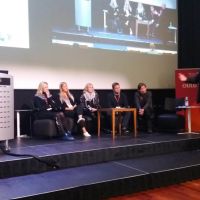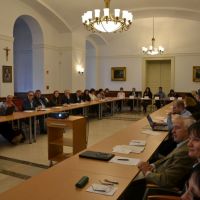The fifth conference of the Oradea process
Knowledge sharing + Oradea | 20 October 2018
Knowledge sharing + Oradea | 20 October 2018
The French-Hungarian Initiative Association (INFH), the Metropolitan Region of Oradea (ZMO) and CESCI organized the program dedicated to aid the Hungarian-Romanian cross-border cooperation for the fifth time in Oradea on October 18, 2018. The “Oradea Process” launched in 2012 aims to help promoting the cooperation between Hungarian and Romanian experts and regional actors based on French best practices. To this end, every year French experts of each subject are invited to the forum. Unlike in previous years, in 2018 the initiators chose not to organize a conference, but a seminar to further help the realization of concrete results.
At the seminar in Oradea, firstly the director of INFH, José Osete, greeted the audience and announced that the organization will be renewed both in the name and in the content as from 2019 the target area will be extended to the whole Central and Eastern Europe. In the first part of the event, three French speakers shared their thoughts. Patrice Eyraud, who had previously worked in the French Ministry of Transport and currently an INFH expert, spoke about barriers to cross-border traffic (legal, environmental, technical) and drew attention to the fact that only 7% of the total European border traffic can be considered to be of a public form.
Julien de Labaca, the project manager of Nouveau-Aquitaine Euskadi Navarre European Territorial Association spoke about developments in the Spanish-French border area. He provided many helpful advice to the audience, especially about persuading the transport companies. The great result of their cooperation is that they operate cross-border lines using their own resources and also developed their own four-language route planner and passenger information portal – which is also available for any border area.
Jean-Baptiste Schiber, the coordinator of the Strasbourg cross-border co-operation, presented the tramline linking the French city to the neighboring German Kehl. The preparation and construction of the new line put in operation in the spring of 2017 took 10 years due to the many obstacles caused by the different rules of the two countries. Today 14% of cross-border commuters use trams whose line is now being extended within Kehlen, which is likely to cause further growth in traffic.
In the second part of the seminar, Hungarian and Romanian experts talked about the conditions of cross-border public transport. Ştefan Roseanu, Romanian expert of COWI, presented the EU and Romanian regulatory background of passenger transport. András Ekes, director of Mobilissimus Kft., gave a lecture on the different levels of cross-border traffic and the possibilities for overcoming them in public transport.
The manager of the ZMO, the host organization, Ciprian Barna, and Viorel Pop, the general director of the local transport company, presented the system of urban transport in Oradea and the history of its gradual expansion, while Deputy Director Szabolcs Tóth outlined a similar picture of the local traffic in Debrecen. Dániel Tóth-Maros, head of the public service center of the Institute for Transport Sciences, analyzed the existing public transport connections and development possibilities of the Romanian-Hungarian border. In this respect, French examples can serve as guidelines for the two neighboring countries, with particular reference to the recently renewed tram train connection project between Debrecen and Oradea.

 EGTC-Workshop 2018/3 (Esztergom)
EGTC-Workshop 2018/3 (Esztergom)